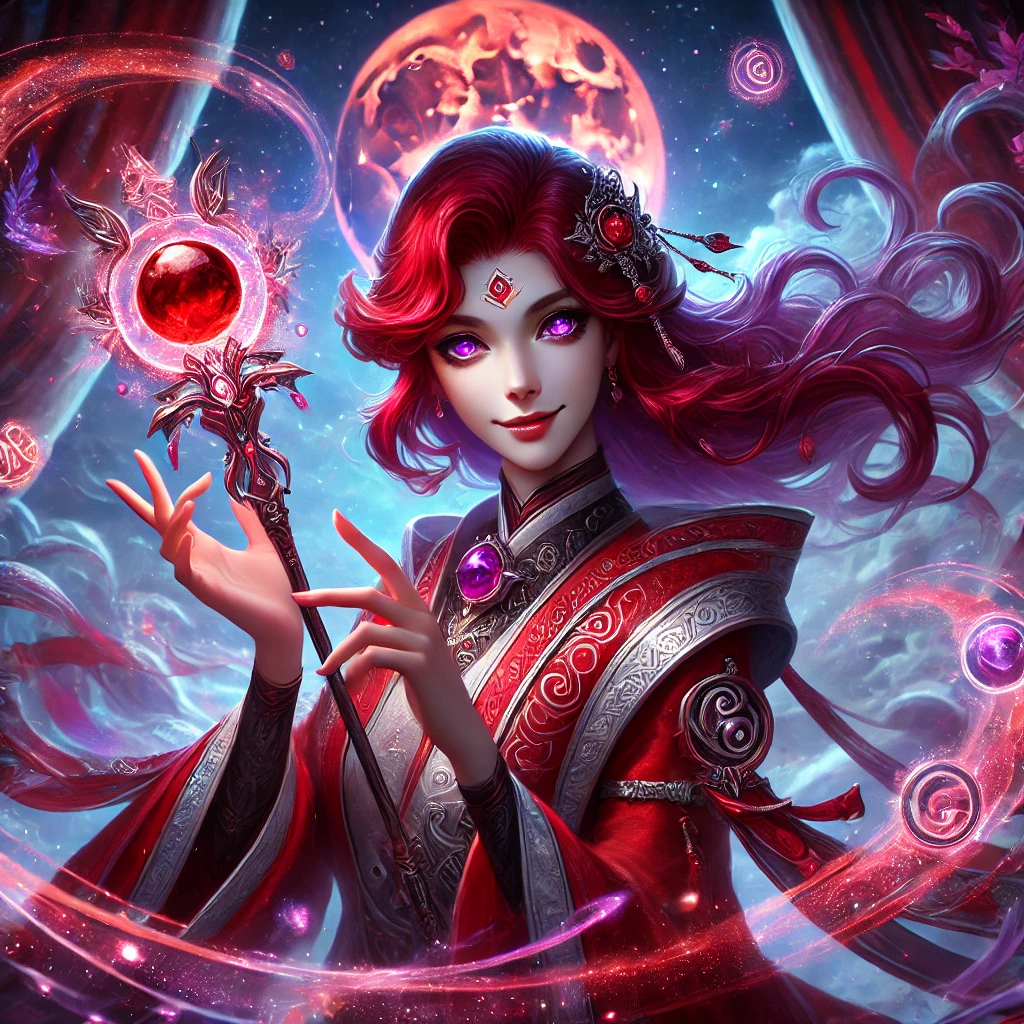Lunitari, the Lady of Illusion
Table of Contents
ToggleIntroduction
In the world of Dragonlance, where magic shapes the fate of Krynn, Lunitari stands as the guardian of balance, illusion, and arcane knowledge. Known as the Red Moon, the Veiled Enchantress, and the Lady of Neutral Magic, Lunitari is the divine patron of Red Robe wizards, those who walk the delicate path between light and darkness, embracing magic for its own sake.
As one of the Gods of Balance, Lunitari ensures that magic remains free from moral or political influence, neither corrupted by evil ambition nor restrained by moral idealism. Her followers are seekers of magical knowledge, illusionists, and scholars, dedicated to the pursuit of understanding rather than control.
Origins and Role Among the Gods
Lunitari is one of the three gods of magic, alongside Solinari (good magic) and Nuitari (dark magic). Unlike her siblings, who view magic through the lens of morality or dominance, Lunitari believes that magic exists as its own force, meant to be studied, explored, and mastered without interference from external ideologies.
She is neither a benevolent guide nor a sinister manipulator—she is a trickster, a teacher, and an enigma, encouraging her followers to think for themselves and explore the true nature of the arcane. Lunitari does not believe in absolute good or evil, only in the limitless potential of magic itself.
Domains and Influence
Lunitari is the goddess of:
- Neutral Magic and Arcane Knowledge – Encouraging magical study free from moral or political influence.
- Illusion and Trickery – Teaching that perception shapes reality.
- Balance and Independence – Ensuring that no one faction of magic gains too much power.
- Secrecy and Mystery – Encouraging exploration and discovery of hidden truths.
Her followers are primarily Red Robe wizards, illusionists, and scholars who believe that magic must be studied and understood on its own merits.
The Red Robes and Lunitari’s Chosen
The Order of the Red Robes, one of the three branches of the Orders of High Sorcery, follows Lunitari’s path. These wizards seek balance, understanding that magic must be preserved and advanced without falling into the extremes of selfless servitude (White Robes) or unchecked ambition (Black Robes).
Unlike their counterparts, Red Robes do not swear allegiance to good or evil. Instead, they walk the middle path, learning magic for the sake of magic, believing that its power should be wielded without moral constraints, but also without reckless greed.
Symbols and Worship
Lunitari is often depicted as a graceful woman in flowing red robes, with mischievous eyes and a knowing smile. Sometimes, she appears as a masked figure, hinting at hidden truths and the unseen forces behind reality.
Her sacred symbols include:
- A full red moon – Representing neutrality and arcane power.
- A swirling mask or veil – Symbolizing illusion and the shifting nature of truth.
- A book with blank pages – A reminder that knowledge is never absolute and must be discovered.
Temples to Lunitari are rare, as her followers do not worship in traditional ways. Instead, she is honored in libraries, arcane towers, and private study chambers, where magic is researched and tested without outside influence.
Worship and Rituals
Lunitari’s followers do not engage in structured religious ceremonies. Instead, they honor her through intellectual pursuits, magical experimentation, and the pursuit of deeper knowledge.
Key rituals include:
- The Midnight Study – A tradition where Red Robe wizards meditate under the red moon, seeking inspiration for new spells.
- The Trial of Illusions – A test where wizards must see through deception and create powerful illusions.
- The Dance of the Moons – A rare celestial event where Solinari, Lunitari, and Nuitari align, symbolizing the unity of magic’s three aspects.
Allies and Rivals Among the Gods
As a God of Balance, Lunitari stands between the Gods of Good and the Gods of Evil. She respects:
- Gilean, the god of knowledge, who shares her love of learning.
- Reorx, the god of craftsmanship, who understands the beauty of magical creation.
- Majere, the god of wisdom, who values intellectual discipline.
However, she remains neutral in the conflicts between Solinari and Nuitari. While she dislikes Nuitari’s thirst for domination, she also finds Solinari’s strict morality restrictive. She believes that both perspectives limit the true potential of magic.
Lunitari in Legends and Stories
The First Trick
A famous legend tells of how Lunitari, upon first arriving in Krynn, played a trick on the other gods, weaving an illusion so perfect that even Paladine and Takhisis were fooled. When they demanded to know why she had deceived them, she merely laughed and said, “Truth is but a mirror, and I enjoy breaking glass.” This tale reflects her love of mystery and the ever-changing nature of reality.
The Lost Spellbook
Another tale speaks of a wandering mage who stumbled upon a book said to contain the most powerful spell in existence. When he opened it, he found only blank pages. Furious, he called out to Lunitari, demanding an answer. She appeared and whispered, “The greatest magic is the one you create yourself.”
The wizard, humbled, dedicated his life to the pursuit of original spellcraft, understanding that true power comes from discovery, not from blind faith.

